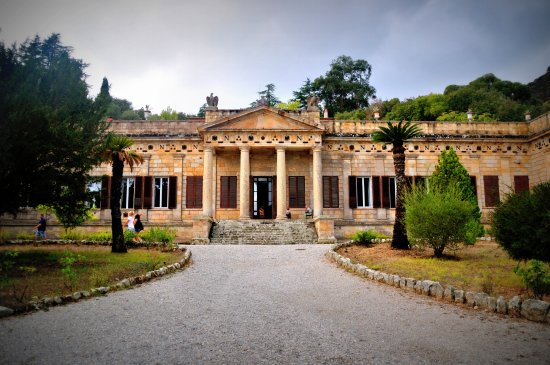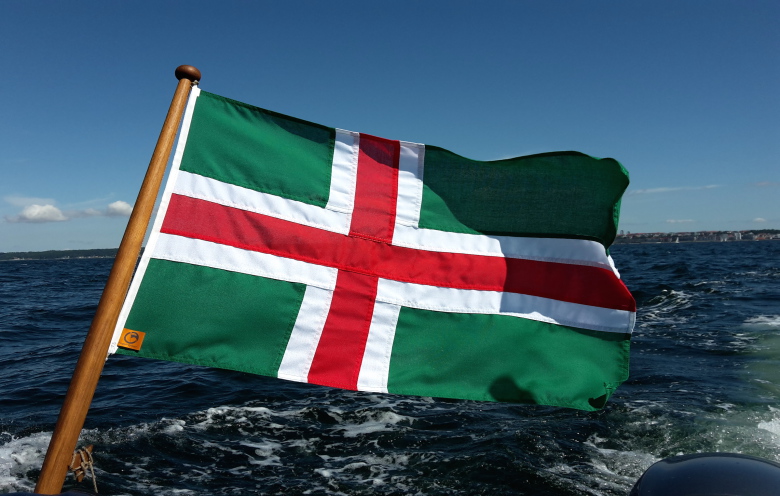

- Ulmicola
- Rookie
 Offline
Offline 
- Registered: 2/22/2021
- Posts: 8
An alternate history of sport or, another kind of Pizza Connection.
This story is about a sport, but it does not begin with an athlete, or a teacher.
It begins with Napoleon. 
Yes, him.
More precisely, it begins when something happened to the former Emperor of the French, that did not happen in reality: while on his road to his first place of exile, the island of Elba, the Corsican general fell gravely ill. And while he was able to recover, he did not recover in full - so, while in our world he was able to escape from the island and enjoy the brief renaissance that eventually led to his defeat at Waterloo and his second exile to the island of Saint Helena, in this world he spent the remainder of his days in the small Tuscan island, ruling over it until his death - as he would've done in our world, had he not been able to escape.
The Villa of San Martino, on the island of Elba, where Napoleon lived. I went there on a school trip, once.
Napoleon not trying his hand at conquest yet again was perhaps the best thing that could ever have happened to one of his old allies, Joachim Murat - the son of a French innkeeper that, through service to the Emperor, was able to rise to the rank of King of Naples and Sicily. In our world, Murat thought about betraying the man he owed everything to but, in the end, he did not. Here, since Napoleon is in an even worse shape than he was in our world, he manages to defect to the side of the winning team, that allows him to keep the southern third of the Italian peninsula - but not Sicily as, even in our world, the fleet of Great Britain was able to keep the island out of the grasp of any of Napoleon's allies, and into that of the House of Bourbon.
Joachim Murat, or Gioacchino as he was known in Naples.
Fast forward a few decades.
It is now 1848: the whole of Europe is experiencing a wave of revolutionary sentiment not seen since 1789 and, in Italy, even some of the more conservative sovereigns are realizing that, in order to keep their behinds firmly planted on their thrones, the best course of action is to cave to the people's demands, make the transition from absolute rule to constitutional rule, and declare war against the hated Austrian Empire in the hope of ending foreign influence over Italy.
In our world, the King of the Two Sicilies backed out of the war effort; here, Lucien Murat - Joachim's heir - is one of the most fervent supporters of the cause. The Italian coalition experiences victory after victory, and the defection of the Austrian fleet to the Italian cause, that was planned in our world (as most of that fleet was staffed by Venetians, only a couple generations after the end of Venice's independence) happens as well: from Istria to the Bay of Kotor, the Austrian flag is replaced with that of the reborn Republic of Saint Mark.
Soundly defeated, the Habsburg realm is forced to recognize the full independence of the peninsula. As envisioned by the likes of Carlo Cattaneo and Vincenzo Gioberti, the Italian states unite in a confederacy not much later - a confederacy loosely modeled after the United States of America, at that, if you try and ignore the fact that the Pope is the ceremonial head of it, and that some of the member states are monarchical in nature.
Fast forward another few decades, to the American Civil War.
You're not going to see this twist coming, guys.
In our world, Abraham Lincoln actually tried to recruit Giuseppe Garibaldi as a general for the Union. However, Garibaldi told him he would've accepted his offer only if Lincoln would've freed every single slave on American soil, immediately. That did not happen, of course, but what if it did? The poncho-wearing adventurer and his many followers reach the opposite shore of the Atlantic Ocean, where they proceed to do what they do best, harassing the Confederacy through proto-guerrilla tactics, maybe even with the help of escaped and/or newly freed slaves.
It is there, in America, that Garibaldi and his men (and women, as the original Thousand had at least one woman among them) are able to spectate quite a few baseball games; the Union soldiers are, likewise, treated to the spectacle of Garibaldi's cohort playing its own team sport of choice and, soon enough, both groups of soldiers begin playing both games against each other, in between one slaughter of Confederate soldiers and another.
The journey home of the Hero of Two Worlds and his men would therefore bring back to Italy more than just glory: it would bring baseball to Italy and pallone to America, changing the history of sport forever. The flag of Italy, as adopted after the Franco-Italian War of 1881.
The flag of Italy, as adopted after the Franco-Italian War of 1881.
Last edited by Ulmicola (3/08/2021 5:15 am)
- SteelersKenny
- Rookie
 Offline
Offline 
- Registered: 2/14/2021
- Posts: 3
Re: An alternate history of sport or, another kind of Pizza Connection.
As someone who's been lurking around this forum, this series sounds really interesting, I wonder what could happen next. With baseball becoming professional soon it could get really great. All this series needs is a good amount of detail and it could be one of the best on the site!
Last edited by SteelersKenny (3/18/2021 10:08 pm)
- Ulmicola
- Rookie
 Offline
Offline 
- Registered: 2/22/2021
- Posts: 8
Re: An alternate history of sport or, another kind of Pizza Connection.
SteelersKenny wrote:
As someone who's been lurking around this forum, this series sounds really interesting, I wonder what could happen next. With baseball becoming professional soon it could get really great. All this series needs is a good amount of detail and it could be one of the best on the site!
Thanks. Now that I think about it, Garibaldi's stint in the US could be a good enough POD on its own, and what I'd prepared during my absence would work well as a baseball TL, juggling two sports was a bad choice. I'll reboot this on the baseball section of the forum soon. ![]()
- •
 1 of 1
1 of 1